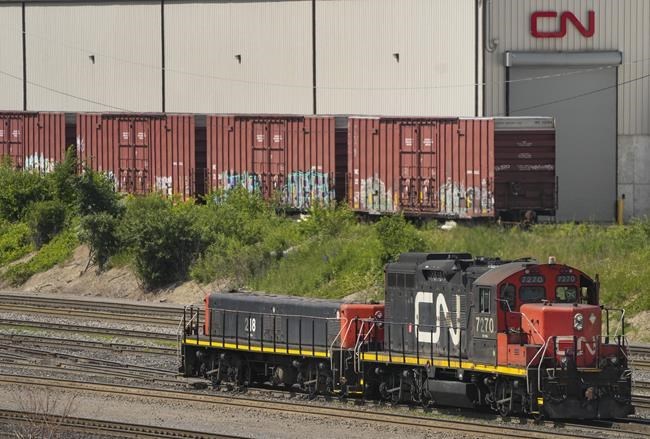MONTREAL — Canadian National Railway Co. is girding itself for ripple effects from the conflict in the Red Sea, where attacks on cargo vessels have prompted a wholesale shift in global shipping.
The ongoing missile strikes by Iran-backed Houthi militants in Yemen have pushed major container carriers to steer clear of the area. Since mid-December, hundreds of vessels have sailed around Africa's Cape of Good Hope instead of passing through the Suez Canal, tacking on major fuel and crew expenses and triggering a spike in freight rates.
The longer travel time and scrambled schedules have resulted in delays of up to three weeks on the majority of container ships slated to roll into the Port of Halifax — a key hub for CN — over the next month.
The crisis has also pushed many shippers who had recently switched to the Suez Canal to return to transpacific routes between Asia and North America, after abandoning them due in part to bottlenecks at the Panama Canal. A Central American drought has prompted backups at the passage, which needs vast amounts of water to raise and lower ships at a dozen locks.
Doug MacDonald, CN's head of marketing, said that while shipments to the East Coast from Asia might be disrupted, the company expects operations to ramp up at the West Coast ports of Â鶹´«Ã½Ó³»and Prince Rupert.
"We’re starting to hear, with the different problems about the Panama and the Suez canal, that the West Coast is looking like a more viable option moving forward. We haven’t seen those volumes come in yet, but we’re expecting them to gradually ramp up," he told analysts on a conference call.
“We’re seeing a lot of interest come to try to fill that up,” he added of the Prince Rupert port, where CN picks up containers from China and drops off propane, coal and wood pellets for export.
Earlier this month, an extreme cold snap in the Prairies hampered CN operations. Extreme cold reduces train lengths — trains hauling container cars cannot exceed 4,500 feet in temperatures below -35 C, versus an 8,000-foot limit at -25 C — and thus cargo volumes and efficiency.
The frigid start to the year followed a fourth quarter where revenues slid slightly due to lower grain and container shipments, even as the company shored up parts of its operations.
The railroad outfit reported revenues of $4.47 billion in the three months ended Dec. 31, a two-per-cent decrease from $4.54 billion in the same period a year earlier.
Revenue actually rose in all categories except forest products and containers — CN's biggest segment, which saw a 20-per-cent year-over-year drop. Automotive revenues increased 19 per cent as supply chain snarls from the COVID-19 pandemic continued to smooth themselves out.
The overall revenue dip marked an improvement from a tough third quarter that saw profits drop thanks to declining consumer demand, fallout from the B.C. port workers strike and a raft of forest fires and floods.
“We came into the fourth quarter a little battle-hardened after a couple of difficult quarters last year, where we managed through a freight recession and a number of external shocks," CEO Tracy Robinson said.
CN expects growth in diluted earnings per share of about 10 per cent this year — the bulk of it coming in the second half of 2024 — and capital spending of about $3.5 billion, she said.
Analyst Chris Murray of ATB Capital Markets said Friday that CN's "operational turnaround remains intact and volumes across several freight types appear to be strengthening heading into 2024," despite weaker Canadian grain prices and uncertainty around container volumes.
In its fourth quarter, net income rose 50 per cent to $2.13 billion from $1.42 billion the year before, with improvements in train speed and dwell time adding to the gains.
On an adjusted basis, diluted earnings fell four per cent to $2.02 per share from $2.10 per share, and slightly beat analyst expectations of $1.99 per share, according to financial markets data firm Refinitiv.
Lower container storage fees and fuel surcharge revenues were partly offset by freight rate hikes and bigger shipments of potash, natural gas liquids and refined petroleum products, CN said.
CN's board of directors approved a seven-per-cent increase to its 2024 quarterly cash dividend, effective for the first quarter of 2024.
This report by The Canadian Press was first published Jan. 23, 2024.
Companies in this story: (TSX:CNR)
Christopher Reynolds, The Canadian Press



